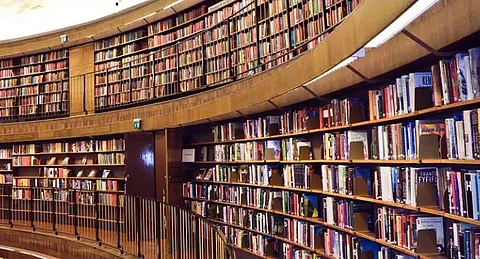
- Home
- Live Blog
- Breaking News
- Top Headlines
- Cities
- NE News
- Sentinel Media
- Sports
- Education
- Jobs

Vijay Garg
(vkmalout@gmail.com)
Today's democratic era advocates an egalitarian society, in which equal opportunities should be provided to every human being without any discrimination for their development and education, and different types of information should be used for human development without any discrimination. Libraries collect, organize, and disseminate books and information to all users without discrimination and fulfil their social and educational responsibilities. We can see the roles in the society in this way,
(i) Education: All types of education to the library
There is a significant contribution in the field of formal and informal education; it acts as a pillar in the education sector, and modern education cannot be imagined without a library. In informal education, education is received indirectly. There, the role of the library becomes even more important in non-formal education, where education is indirectly related to both formal and non-formal education. There is an important contribution in the field of libraries; it acts like a base pillar in the education sector. A detailed description of the role of the library in the field of education is given further. (ii) Research and Development: The modern world and society are dependent on research for their development, and the importance of information and documents in research work is well known. For success in research work, knowledge and knowledge of information are essential; library and information centres use information and documents that are stored, organized, and transmitted, the use of which is very important for research work and is the basis of research work; the role of libraries becomes very important in the field of every type of research work, such as historical, social, or scientific research; apart from this, research is conducted in libraries, where reports
(iii) Cultural: Libraries are actually custodians and carriers of culture. Books are collected and preserved by libraries, and it goes without saying that only through books and documents can we preserve our history and cultural values for the future. Apart from this, it preserves the important cultural heritage of the society, thus cultural values ??are preserved by libraries and many cultural activities are conducted like drama, Kavi Goshthi, story discussion etc., programs are also done, libraries have an important role in conducting cultural activities and preserving cultural values.
(iv) Information Communication: Information and documents are collected and organized by libraries and information centres, due to which it is a huge store of systematic information and that information is disseminated according to the needs of the user, thus the library not only collects information rather it is also disseminated, thus library information dissemination is also functioning as credit centres.
(v) Religious and Spiritual: There are many types of books—informative, entertaining, inspirational, etc. Inspirational books are often based on religion and spiritual matters, and libraries contribute to religious and spiritual work by collecting such books.
(vi) In the time of recreation and leisure: Apart from bread, clothes and house, many things are also important for humans, in which, apart from their daily work, in leisure and free time entertainment is also one, every person uses a variety of means for his entertainment and the most common habits are found in study. Access is also fulfilled; thus, not only is entertainment important, but it is also important to make good use of time in moments of leisure, and if he spends his free time in good books, then it is important in the character building of a human being. In this way, the use of libraries in recreational and leisure moments is the best use for human beings.
(vii) Development of democratic values: It advocates equal opportunities for every citizen in democratic countries and societies for their development and education without any discrimination, and emphasises that information should be used without any discrimination for human development and that books and information are collected, organized, and disseminated by libraries to all users without any discrimination. Thus, we see that the entire concept and purpose of libraries, especially public libraries, is based on democratic values; it does not make any kind of discrimination in providing service and provides its services for equal access to both sexes, which is based on the fundamental principles of democracy and thus propounds democratic values.
(viii) Libraries and changing society: Society is changing rapidly and due to this. It is very difficult to adjust to the change, but the library is such an institution where, in a changing environment, old information is equally important as new information. This is the reason why the collection of information and its updated collection development are very necessary, as well as the use of new techniques; through them, the change is reconciled by resorting to experiments like bringing innovation to information services for the transmission of information in the present time. The internet and other means of communication are also being used.